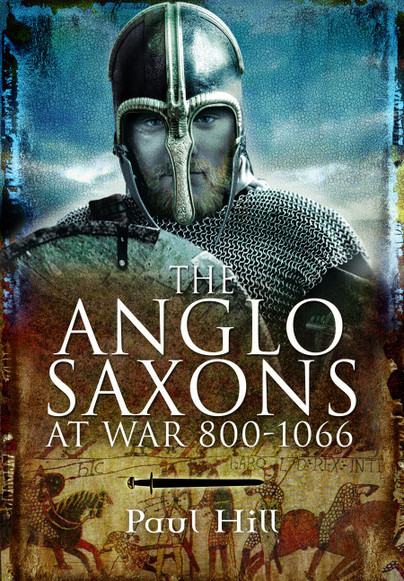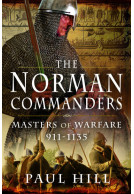The Anglo-Saxons at War (Paperback)
Imprint: Pen & Sword Military
Pages: 224
Illustrations: 30 black and white illustrations
ISBN: 9781399077156
Published: 6th October 2022
(click here for international delivery rates)
Need a currency converter? Check XE.com for live rates
| Other formats available | Price |
|---|---|
| The Anglo-Saxons at War ePub (4.7 MB) Add to Basket | £6.99 |
In the time of the great Anglo-Saxon kings like Alfred and Athelstan, Æthelred and Edmund Ironside, what was warfare really like – how were the armies organized, how and why did they fight, how were the warriors armed and trained, and what was the Anglo-Saxon experience of war? As Paul Hill demonstrates in this compelling new study, documentary records and the growing body of archaeological evidence allows these questions to be answered with more authority than ever before. His broad, detailed and graphic account of the conduct of war in the Anglo-Saxon world in the unstable, violent centuries before the Norman Conquest will be illuminating reading for anyone who wants to learn about this key stage of medieval history.
The role of violence and war in Anglo-Saxon society is explored, in particular the parts played by the king and the noblemen, and the means by which, in times of danger, the men of the fyrd were summoned to fight. The controversial subject of the Anglo-Saxon use of cavalry is also explored. Land and naval warfare are central sections of Paul Hill's book, but he also covers the politics and diplomacy of warfare – the conduct of negotiations, the taking of hostages and the use of treachery.
The weapons and armour of the Anglo-Saxons are described – the spears, the scramsaxes, axes, bows, swords, helmets, shields and mail that were employed in the close-quarter fighting of the day. Among the most valuable sections of the study are those dealing, in vivid detail, with actual experience of battle and siege – with the brutal reality of combat as it is revealed by campaigns against the Danes, in the battles of Ashdown, Maldon and Stamford Bridge, and sieges at Reading and Rochester.
Informatively enhanced for the reader with the inclusion of maps, tables, figures, an appendix (Rulers of the English c. 871-1066), a bibliography and an index, "The Anglo-Saxons at War 800-1066" is a key addition to both community and academic library Medieval British History collections and supplemental curriculum studies lists.
Midwest Book Review
Read the full review here
Paul Hill is a writer at home and in love with his subject. He has produced another interesting and enjoyable book which offers a fascinating and thorough account of all aspects of warfare in the time of the great Anglo-Saxon kings, their wars against each other, the Danes and the Vikings. He uses documentary records, the Bayeux Tapestry and the Anglo-Saxon Chronicle, poems and ballads plus a growing body of archaeological evidence to answer the pertinent questions – Why did the Saxons go to war, so often over such a long period of time? How were warriors trained and armed? How were armies organized? How did they fight, what were the weapons used, what was close combat really like?
Norfolk Family History Society - 'The Ancestor' magazine
The text is well written and easy to follow, organized by topic with a handy Index so that the reader can dip in and out depending on whatever interests one at the time. It provides a detailed and graphic account of the conduct of war in the Anglo-Saxon world during three unstable, violent centuries which destabilised the kingdom and led to ultimate defeat by the Normans. Altogether an essential addition for anyone with an interest in Anglo-Saxon history.
5 Key Weapons of the Anglo-Saxon Period
History Hit, September 2019
Author article on History Hit
An excellent book that would appeal to anyone with an interest in this turbulent period of history, the casual reader or the wargamer.
The Battlefields Trust
This book is simply a must for anyone interested in the military aspects of Anglo-Saxon England. Paul Hill's writing style makes the book an easy read for the complete novice as well as those with more comprehensive knowledge. I literally couldn't put it down, devouring the information this book contained.
Customer Review
If you are looking for a research book on the period, this is it. The author provides some very good detail on small unit tactics and weapons of the age that gives more substance to the big picture strategic level Osprey Men at Arms series on Viking, Normans and Saxons.
Customer Review
Paul Hill’s fifth Anglo-Saxon history book is a truly fascinating, detailed and thorough account of all aspects of Warfare in the period – beginning with the rise of the Kingdom Wessex and detailing with the rise of the developments up to the Norman Conquest…This book would be a very worthwhile acquisition for anyone with an interest in military and Anglo-Saxon history.
Hexham Local History Society
Hill offers some useful insights into the mindset of the military in those days, and presents a good working summary of recruitment, equipment, manoeuvres and training…Hill’s prose style is terse but engaging, and he carries the reader along without effort.
Medieval Warfare
There is not an enormous amount of information from this war-like society, and they remain somewhat mysterious. Paul Hill does an excellent job compiling and summarizing historical documents about this time period. He does his best to stick to the facts, but (rightfully) does not dismiss tales and poems as sources of information. What the reader gets is an easy-to-follow interpretation of how and why the Anglo-Saxons fought their enemies… and each other.
Rambles.net
The book is fairly concise (200 pages), and it is organized by topic, rather than chronologically. This makes it fairly easy to read in whatever order you choose. It also includes a handy index so that you jump to whatever section interests you at that moment. From the weapons and tactics they used, to specific battles like Ashdown and Hastings, to the reasons why the culture was so war-like and unstable, the book explores sources like the Bayeux Tapestry and the Anglo-Saxon Chronicle to provide a clear picture of what went on during this brutal period.
The book works well as an introduction to those who are interested but have not put a lot of study into the topic. It also works well as a high-level discussion of sources and what can be inferred and theorized from them. Either way, you will come away from this book with a greater understanding of the Anglo-Saxons and their culture of war.
About Paul Hill
Paul Hill is well known as a lecturer, author and expert on medieval warfare and military archaeology, and he has written several books on these subjects, among them The Age of Athelstan: Britain's Forgotten History, The Viking Wars of Alfred the Great, The Anglo-Saxons at War 800-1066, The Norman Commanders: Masters of Warfare 911-1135, The Knights Templar at War 1120 -1312 and The Kingdom of the Anglo-Saxons: The Wars of King Alfred 865-899.



















